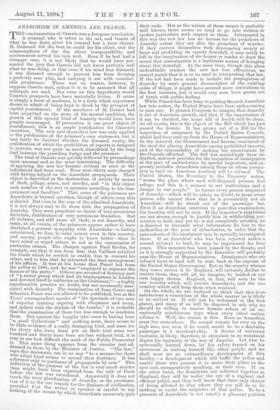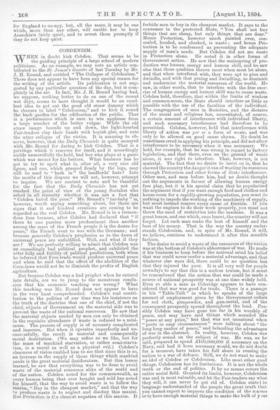ANARCHISM IN AMERICA AND FRANCE. T HE condemnation of Caserio was
a foregone conclusion. A criminal who is taken in the act, and boasts of what he has done, gives his counsel but a poor chance. M. Dubreuil did the best he could for his client, and the commonplaces of the day about irresponsibility and environment served his turn well. Even if he had had a stronger case, it is not likely that he would have per- suaded the jury that Caserio did not know perfectly well what he was doing, or that even if his mind was diseased, it was diseased enough to prevent him from devising a perfectly sane plan, and carrying it out with consider- able persistence. There was no reason, however, to suppose Caserio mad, unless it is to be assumed that all criminals are mad. Nor 'even on this hypothesis would Caserio's prospects have been materially better. If crime is simply a form of madness, it is a form which experience shows to admit of being kept in check by the prospect of capital punishment. If the murderer of M. Carnet had been acquitted on the score of his mental condition, the growth of this special kind of insanity would have been greatly encouraged. If prevention is one great object of punishment, this is an ample justification for Caserio's execution. The new anti-Anarchist law was only applied to the publication of the prisoner's own statement, but it may fairly be doubted whether the diseased vanity, the gratification of which the prohibition of reports is designed to prevent, was not quite as much stimulated by the long duel between the presiding Judge and the prisoner. The trial of Caserio was quickly followed by proceedings more unusual and so far more interesting. The difficulty of applying the new law became evident as soon as the indictment had been read. Here were thirty men charged with having helped on the Anarchist propaganda. Their object is described as the destruction of society by means of theft, pillage, arson, and murder, and "in this object each member of the sect co-operates according to his tem- perament and faculties." That some of the prisoners are Anarchists is beyond question, though of others even this is denied. But even in the case of the admitted Anarchists, it is not always easy to fix them with the propagation of Anarchy. They were preachers no doubt of very pernicious doctrines, distributors of very pernicious literature. But all violence, and still more all theft, is not Anarchy, and some, at all events, of the prisoners appear rather to have cherished a general sympathy with Anarchists—a feeling entertained, we fear, to some extent even in this country, and among people who ought to know better—than to have aided or urged others to aid in the commission of particular crimes. The charges against Paul Reclus, for example, are that it was from him that Valliant solicited the funds which he needed to enable him to commit his crime, and to him that he intrusted the final arrangement of his affairs. It was at his house that Pawel hid from the police in 1891, and he was employed to orga,nise the finance of the party." Others are accused of forming part of "a secret group which had its headquarters in London and devoted itself to robberies on the Continent,"—a highly reprehensible practice no doubt, but not necessarily asso- ciated with Anarchy. The examination of Jean Grave and Sebastien Faure was not allowed to be published, but as the Times' correspondent speaks of "the spectacle of two men of superior training arguing with eloquence and, irony, and indeed with the disdain of the fanatic," it is probable that the examination of these two was enough to condemn them. But against the burglar who owns to having been "a good Collectivist" and nothing more, there seems to be little evidence of a really damaging kind, and since for the thirty who have been put on their trial some two hundred and, thirty have been set free without trial, it is easy to see how difficult the work of the Public Prosecutor is. This same thing appears from the circular just ad- dressed to them by the Minister of Justice. "The law," says this document, can in no way "be a menace for those who adopt legal means to spread their doctrines. It has reference only to partisans of propaganda by acts." This definition of the purpose of the law is very much stricter than might have been expected from the talk of Paris before the law was introduced d. Apparently it does not touch the mere glorificatioauocef Anarchy, or theproclama- tion of it as the one remedy for the diseases of civilisation, provided Viet the writer or speaker is careful to say nothing of the means by which Anarchists commonly gain their ends. But as the nature of these means is perfectly well known, there seems no need to go into written or spoken particulars with respect to them. Interpreted in this way the new law has no terrors for the preachers of Anarchy unless they are also the preachers of murder. If they content themselves with denouncing society at large and predicting its speedy downfall, it may safely be left to the imagination of the hearer or reader to draw the moral that assassination is a legitimate means of bringing about this downfall. At the same time, though this gloss undoubtedly renders the new law. less efficacious, we cannot regret that it is to be used in interpreting that law. If the law had been made to include the propagation of Anarchy by mere general denunciation of the existing order of things, it might have secured more convictions in the first instance, but it would very soon have grown out of touch with public feeling. While France has been busy in putting the anti-Anarchist law into action, the United States have been endeavouring to pass one. It pleases Congress to imagine that Anarchy is not of American growth, and that if the importation of it can be checked, the home bill of health will be clean. At all events, this is the object of the Bill which has just passed the Senate. It has grown out of a Bill for the inspection of emigrants by the United States Consuls, which had been sent up from the House of Representatives. In the interval, the Government had become convinced of the need for placing Anarchists among prohibited imports, and of the impossibility of making the examination by the Consuls effectual. The Bill has accordingly been re- drafted, and now provides for the inspection of immigrants at the port of embarkation by special inspectors, and ex- pressly includes Anarchists among those to whom permis- sion to land on American territory will be refused. The United States, the Secretary to the Treasury writes, "seems the place where such evil-disposed persons find refuge, and this is a menace to our institutions and a danger to our people." In future every person suspected of Anarchy—which will be taken, no doubt, to mean every person who cannot show that he is presumably not an Anarchist—will be struck out of the passenger list. Even if an Anarchist contrives to pass this examination, his troubles will not be over. If the inspector's suspicions are not strong enough to justify him in withholding per- mission to land, and yet he is not completely satisfied, he is directed to transmit what information he has to the authorities at the port of debarkation, in order that the antecedents of the immigrant may be specially investigated there. If an Anarchist who has been rejected makes a second attempt to land, he may be imprisoned for four years. This measure has been passed by the Senate, and as it is strongly supported by the Executive will probably pass the House of Representatives. Immigrants who are refused leave to land will be sent back at the expense of the United States Government. But as the country whence they came, unless it be England, will certainly decline to receive them, they will all, we imagine, be landed on our own happy shores. England, in fact, will soon be the one country which will receive Anarchists, and the one country which will keep them when received. On the whole, we are inclined to think that this is as satisfactory a conclusion of the whole matter as is likely to be arrived at. It will not be welcomed at the first glance, and many of us will be disposed to ask why we should be willing to receive human refuse of an ex- ceptionally mischievous type when every other nation refuses it. Well, the reason is this. Even an Anarchist must live somewhere. He cannot remain for ever on the high seas, nor, even if he could, would he be a desirable passenger in a merchant-ship. A decree of universal exclusion is likely, therefore, to stimulate in an unnatural degree his ingenuity in the way of disguise. Let him be universally hunted down, let his safety depend on his cleverness in making himself like other people, and we shall soon see an extraordinary development of this faculty,—a development which will baffle the police and enable those who possess it to make their plans on the spot and, comparatively speaking, at their ease. If, on the other hand, the Anarchists are collected together in England, they will be under the eye of a vigilant and efficient police, and they well know that their only chance of being allowed to stay where they are will be to do nothing to excite the suspicion of that police. To be a preserve of Anarchists is not exactly a pleasant position for England to occupy, but, all the same, it may be one which, more than any other, will enable her to keep Anarchists fairly quiet, and to arrest them promptly if they do not keep quiet.



































 Previous page
Previous page